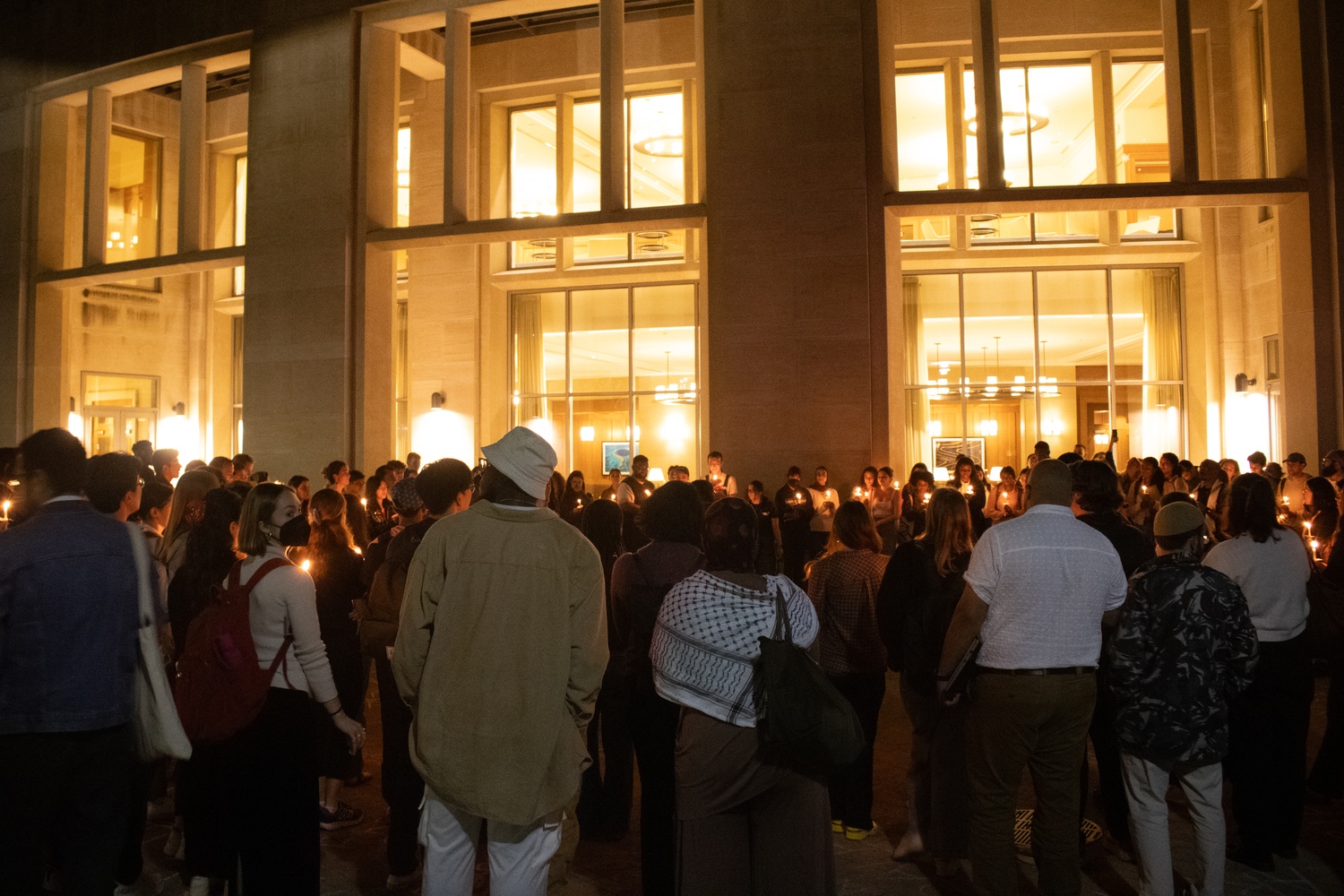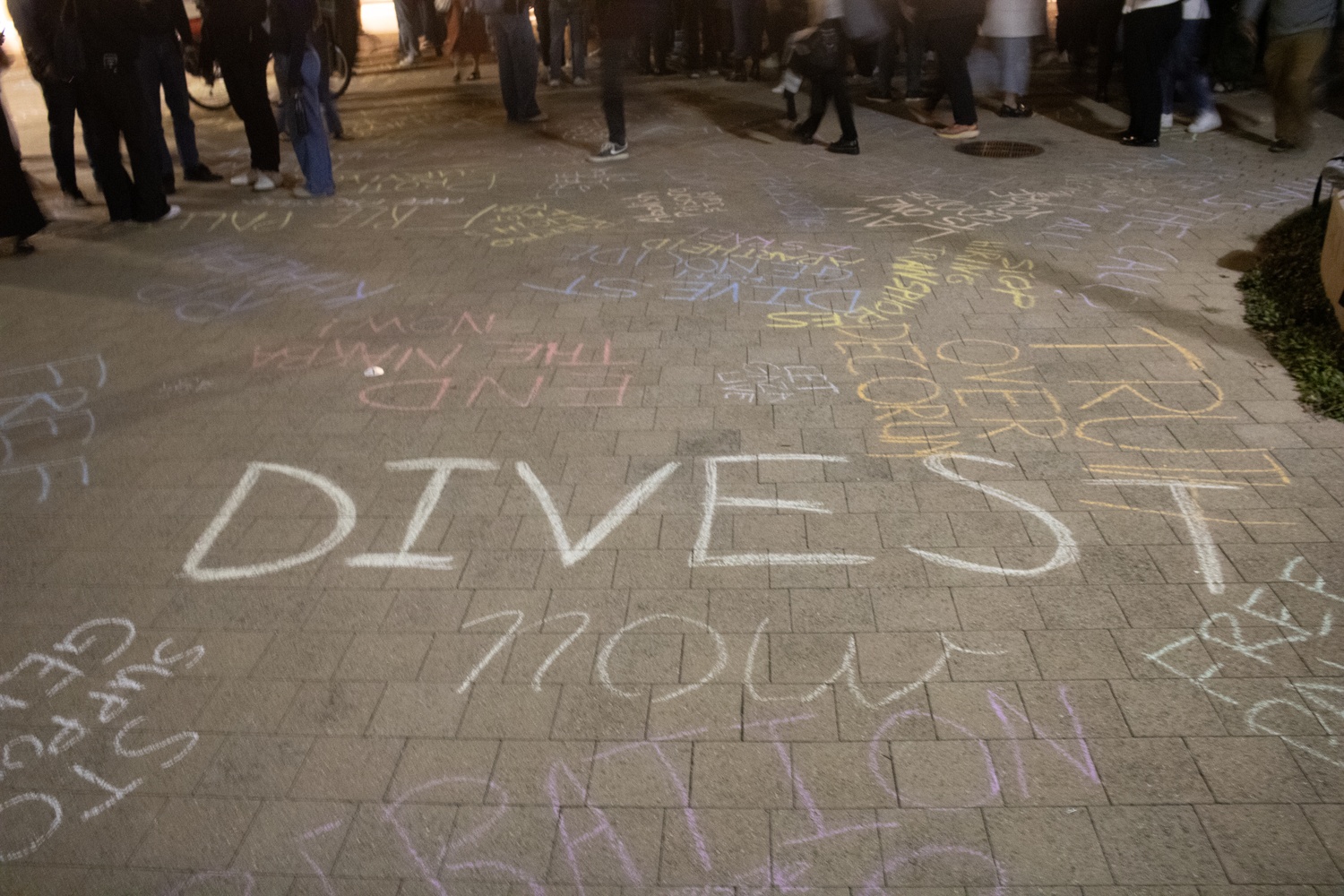
News
News Flash: Memory Shop and Anime Zakka to Open in Harvard Square

News
Harvard Researchers Develop AI-Driven Framework To Study Social Interactions, A Step Forward for Autism Research

News
Harvard Innovation Labs Announces 25 President’s Innovation Challenge Finalists

News
Graduate Student Council To Vote on Meeting Attendance Policy

News
Pop Hits and Politics: At Yardfest, Students Dance to Bedingfield and a Student Band Condemns Trump
Harvard Law School Admin, Activists Clash Over Protest Rules

More than 200 students met in Wasserstein Hall at Harvard Law School on Monday to discuss the history of the Law School and its student activist movements — but it also served as an act of protest against the HLS administration.
The annual event, called “DisOrientation,” was co-sponsored by unrecognized student groups Dissent Collective and Harvard Out of Occupied Palestine, which staged the 20-day Harvard Yard encampment last spring. This year, the event centered around pro-Palestine organizing on HLS’ campus and across the University in the past year — including the University’s response to the encampment.
Though “DisOrientation” has been an annual tradition at HLS since 2015, this year’s rendition was a statement from student protesters.
On Aug. 30, days before the first day of classes, Law School Dean of Students Stephen L. Ball and Assistant Dean for Community Engagement, Equity, and Belonging Monica E. Monroe sent an HLS-wide email blast reminding students of academic policies — but more than one-third focused on “community norms for engagement in shared campus spaces.”
In the month since, the struggle between student protesters and HLS administrators has narrowed in on “Belinda Hall,” an area in the Caspersen Student Center that is officially known as Haas Lounge.
“Belinda Hall” has historically been a place of protest: in 2016, students occupied the area in an effort to create a safe space for minorities — which they claimed had been denied on HLS’ campus — and renamed the space after Belinda Sutton, a woman enslaved by the prominent Royall family of Massachusetts.
In their August email, Ball and Monroe also announced that interim HLS Dean John C.P. Goldberg had formed a “Haas Lounge Advisory Group” — consisting of professors Maureen E. “Molly” Brady ’08, Guy-Uriel E. Charles, Andrew M. Crespo, Jeannie Suk Gersen, Eloise P. Lawrence, and two additional administrators — to decide whether the rule on the usage of the space should be modified in the future.
However, students were not deterred by the group’s formation.
On Sept. 17, the Dissent Collective posted an announcement for this year’s event, writing that it was “coming soon to Belinda Hall.”

The same day, the Harvard Law School Student Government passed a resolution urging the Law School to safeguard the right to use the Haas Lounge for gatherings of any kind by students, faculty, and staff without approval or reservations. The resolution passed on a six to two vote.
The resolution — the first of this Student Government’s term — stated that any future registration process to use the Caspersen Student Center space “should not create any barriers to free speech, dissent, protest, organizing; or other normal and long-standing uses of the space.”
The resolution directly names “DisOrientation” and last year’s protests calling for a ceasefire in Gaza as examples of activities that should be allowed in the space.
But on Friday, three days before the planned event, Ball and Monroe again emailed HLS students to clarify the use of Haas Lounge — specifically, the prohibition of “planned, organized, or coordinated gatherings that preclude or interfere with the normal use of the Lounge as a place for personal or small-group study and conversation.”
Violations of the policy, they wrote, “may result in disciplinary proceedings that could have professional consequences.”
This time, the warning worked.
In a Sunday Instagram post, Dissent Collective wrote that they moved the location of “DisOrientation” after “HLS administrators threatened student organizers with discipline.”
“This is a dark chapter in DisOrientation’s story,” the group wrote.
At the Monday event, a speaker slammed the Law School, saying that “the Palestine exception hurts us all this year.”
Jeff Neal, spokesperson for Harvard Law School, declined to comment for this article.

During small group discussions, student organizers also encouraged attendees to make use of the Caspersen Student Center space for “personal and small groups of conversation that respect the rights of others to use the space.”
HLS Emeritus Professor Duncan Kennedy also spoke at the beginning of the program in support of the protesters.
“You’re here because you reached a point of successful organization to actually threaten the authorities that you occupy and operate,” Kennedy said.
The program was followed by a candle-lit vigil for victims of the war in Gaza and a chalking of the sidewalk outside of Wasserstein Hall, a violation of the University’s recently-updated ban on chalking following increased campus protests.
By Tuesday morning, the messages had been washed away.
—Staff writer S. Mac Healey can be reached at mac.healey@thecrimson.com. Follow him on X @MacHealey.
—Staff writer Saketh Sundar can be reached at saketh.sundar@thecrimson.com. Follow him on X @saketh_sundar.
Want to keep up with breaking news? Subscribe to our email newsletter.
